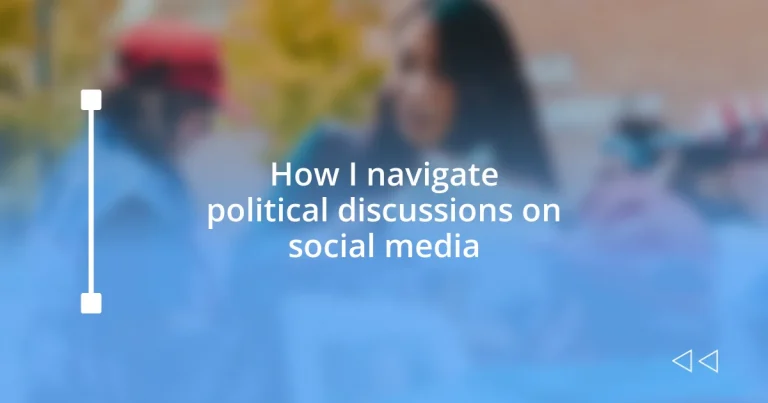Key takeaways:
- Understanding the unique tone and audience of each social media platform enhances the quality of political discourse and broadens perspectives.
- Choosing clear discussion goals—such as educating, connecting, or listening—can lead to more constructive conversations and foster mutual understanding.
- Using respectful language and open-ended questions promotes a collaborative atmosphere, allowing for deeper engagement and meaningful exchanges.
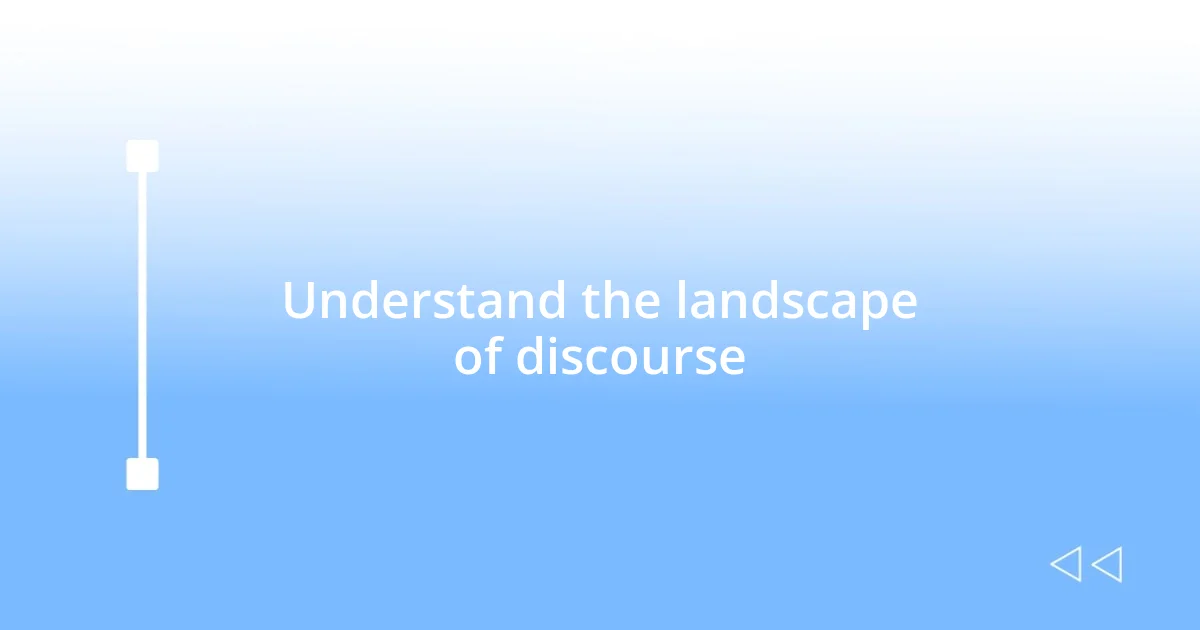
Understand the landscape of discourse
Navigating the intricate landscape of political discourse on social media requires a keen understanding of the platforms involved. I’ve noticed that each platform tends to foster a distinct tone and audience. For instance, Twitter often pulses with brevity and urgency, while Facebook allows for deeper, albeit sometimes more polarized, conversations. Have you ever found yourself scrolling through a heated Twitter thread, feeling that adrenaline rush as comments fly fast and furious? It’s a reminder that the medium shapes the message profoundly.
Engaging in these discussions also exposes us to varying perspectives, which can be both enlightening and uncomfortable. I remember a time when I encountered a viewpoint that challenged my beliefs—initially, I felt defensive, but I eventually realized that embracing discomfort can lead to growth. Isn’t it fascinating how the political conversation can sometimes reflect personal growth? The emotional responses we experience not only shape our understanding but also influence how we interact with others.
Lastly, being aware of the echo chambers that often form on social media is crucial. I’ve sometimes found myself in a bubble, surrounded by like-minded individuals, which can feel reassuring but also limiting. It begs the question: how can we break free from this and seek out diverse viewpoints? Engaging authentically with differing opinions can enhance our understanding and foster more meaningful discussions.
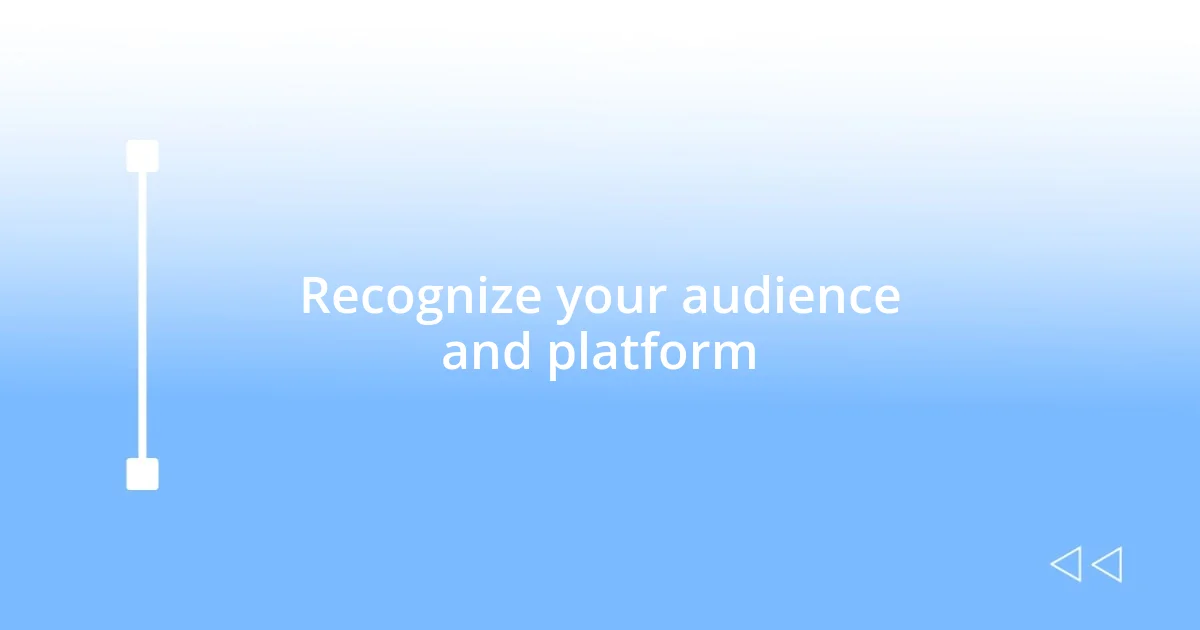
Recognize your audience and platform
Recognizing your audience on social media is key to shaping your discourse. For example, I remember participating in a heated debate on Instagram, where visuals often dominate the conversation. I quickly learned that a well-crafted image could sway opinions as much as logical arguments. Understanding the platform helps tailor your message to resonate with the specific audience you’re addressing.
Consider these key aspects:
- Demographics: Know who typically engages with your content. Are they younger, older, or more politically active?
- Tone: Each platform has a unique vibe—Twitter demands concise, punchy remarks, while LinkedIn calls for a more professional tone.
- Engagement Style: Determine how followers prefer to interact. Do they seek debate, consensus, or simply information?
- Cultural Context: Recognizing the cultural nuances can change how your words are received—what’s acceptable in one space may not be in another.
Ultimately, considering these factors can guide how I express my thoughts, making my contributions not only more engaging but also more impactful.

Choose your discussion goals wisely
Choosing discussion goals wisely can fundamentally alter the outcome of your political conversations on social media. I often reflect on my approach before diving into a debate, asking myself what I genuinely want to achieve. Is my goal to educate, persuade, or simply share my perspective? Last week, I found myself in a Facebook group where the discussions were veering towards misinformation. Instead of engaging in an emotional back-and-forth, I decided to focus on sharing factual information. By clarifying my intent, I noticed my comments led to more constructive exchanges, sparking curiosity rather than hostility.
It’s also important to consider what I value most in these interactions. I recall a time I entered a Twitter debate where I aimed to challenge misconceptions. However, I quickly realized that fostering a connection was more significant to me than merely winning an argument. By keeping my discussion goals aligned with building mutual understanding, I created a space for others to engage honestly. This approach not only enriched my experience but also helped dismantle hostility among the participants.
Above all, I believe silence can be a powerful goal. Sometimes, stepping back can serve a greater purpose. There was a moment during a divisive election cycle when I opted not to share my views online. Instead, I dedicated that time to listening to others. Reflecting on that decision, I felt it allowed me to enter future discussions with a more open mind. Choosing silence can sometimes clarify our thoughts and lead to healthier dialogues down the road.
| Discussion Goal | Example Scenario |
|---|---|
| Educate | Sharing facts to clarify misconceptions in a heated thread. |
| Connect | Engaging in a dialogue to understand differing perspectives. |
| Listen | Choosing to observe rather than engage, leading to deeper understanding. |
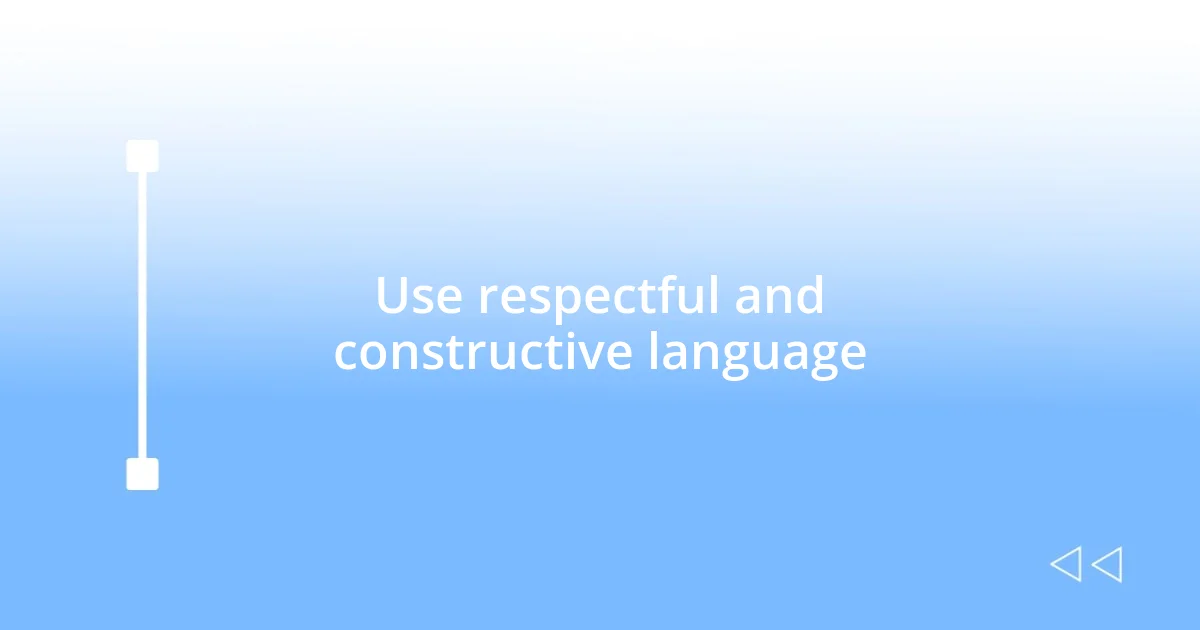
Use respectful and constructive language
Using respectful and constructive language in political discussions can truly change the tone of the conversation. I remember a time I commented on a friend’s social media post about a controversial topic, and instead of launching into a critique, I simply expressed my viewpoint while acknowledging theirs. This approach not only helped keep the discussion grounded but also made my friend more open to hearing what I had to say. Have you ever noticed how a simple shift in wording can completely alter the direction of a discussion?
On another occasion, I found myself in a thread where emotions were running high over a sensitive issue. Rather than firing back with my opinions, I took a step back. I focused on asking clarifying questions instead of making statements. Questions such as, “What led you to that conclusion?” can invite a more thoughtful exchange. I noticed that when I framed my language in a way that invited dialogue rather than debate, the atmosphere shifted from defensive to collaborative, promoting understanding.
Being mindful of language also extends to our choice of words. I often reflect on how using terms like “I believe” or “In my experience” instead of absolutes makes discussions feel less confrontational. When I share personal experiences, instead of presenting facts as the absolute truth, it invites others to relate without feeling attacked. This strategy has not only made my discussions more constructive but has also built a sense of community around differing perspectives. How do you express your opinions in a way that fosters respect?
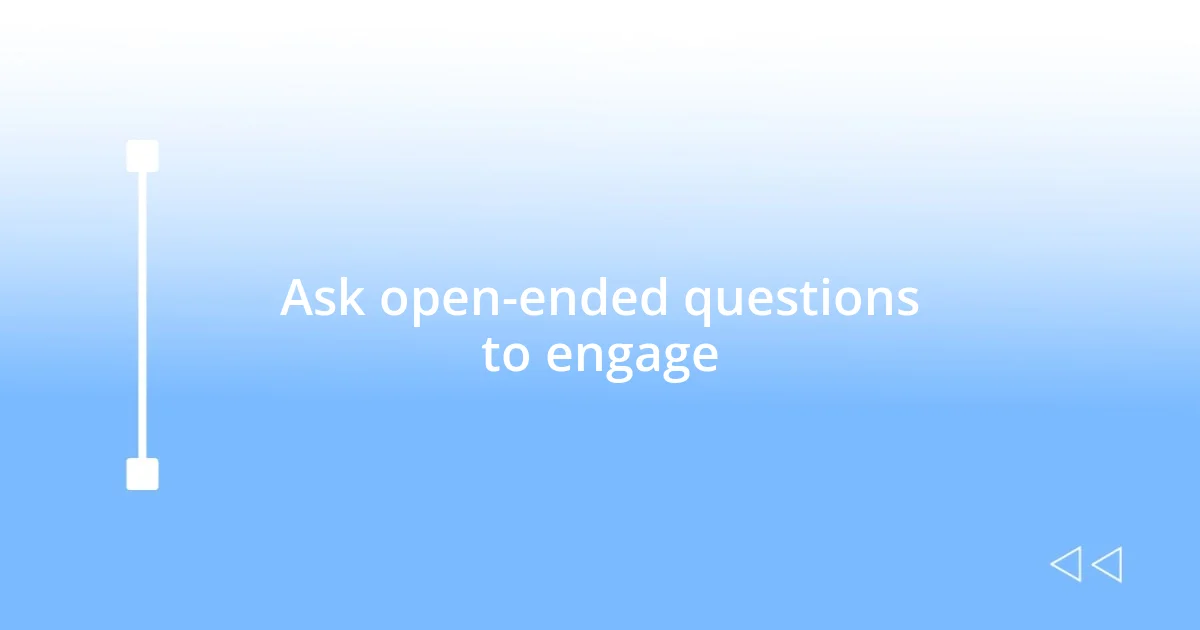
Ask open-ended questions to engage
Asking open-ended questions can be a true game-changer in political discussions on social media. One time, I posted a thought-provoking question on a complex political issue, like “What do you think are the benefits and drawbacks of this policy?” The results were incredible. Instead of a heated argument, people began to share their opinions and experiences, creating a space for deeper understanding. Isn’t it fascinating how a simple question can steer the conversation in a more constructive direction?
I’ve found that open-ended questions not only slow down the pace of the discussion but also invite others to reflect and articulate their thoughts. For instance, when I posed the question, “How has this issue personally affected you?” I noticed participants became more introspective and willing to share their stories. This kind of connection felt powerful. It reminded me that behind every opinion, there’s a personal experience that deserves to be heard. Isn’t that what we really want in these discussions—authentic connections?
By encouraging dialogue through questions, I often feel like I’m not just talking at people but engaging with them. It creates a sense of community, even amidst disagreements. When someone responded to my query with, “I hadn’t thought of it that way; can you elaborate on your perspective?” I felt a genuine respect for our differing views. Open-ended questions are like bridges in conversations, transforming potential conflict into a richer discourse full of insights. Don’t you think this approach can lead to more meaningful exchanges?
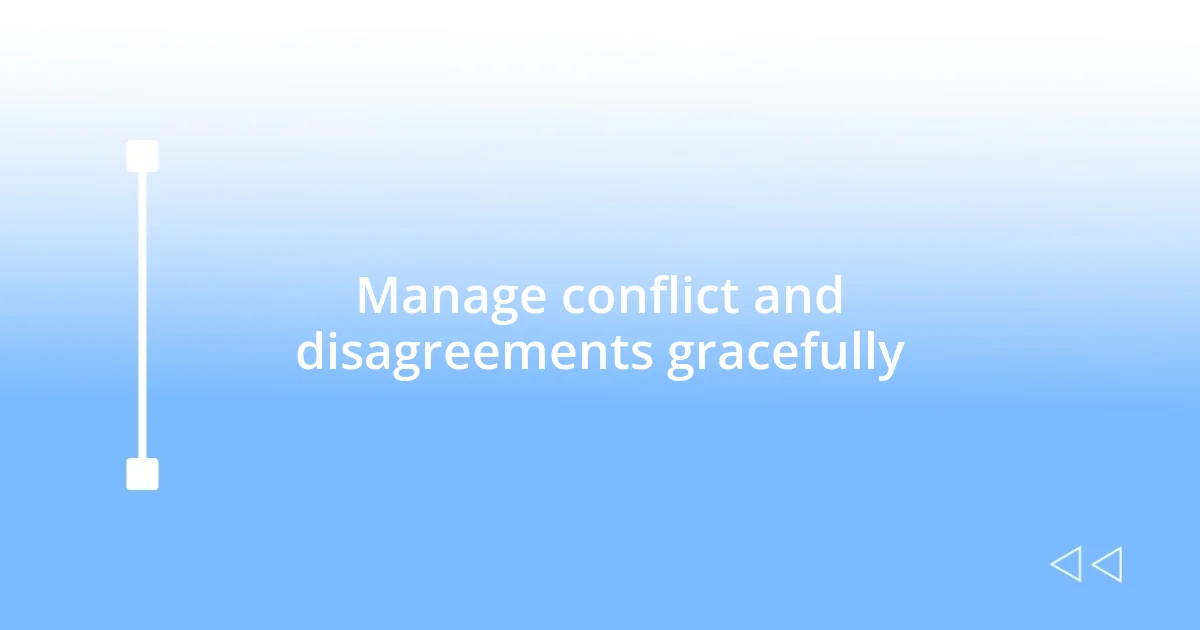
Manage conflict and disagreements gracefully
Navigating conflict on social media can be tricky, but I’ve found that maintaining a calm demeanor is crucial. I once participated in a debate where tensions escalated quickly. Instead of mirroring the rising confrontation, I took a deep breath and calmly reiterated the main point of my argument. This shift in energy led others to lower their defenses, allowing for a more productive dialogue. Have you ever noticed how staying composed can influence the tone of the entire conversation?
Emotional intelligence plays a key role here as well. I remember a time when someone was upset about my viewpoint. Rather than dismissing their feelings, I acknowledged their frustration and asked how they felt about the topic. This response not only defused their anger but also opened the door to a deeper understanding of their perspective. Doesn’t it make sense that when we validate emotions, we pave the way for more meaningful communication?
Sometimes, it helps to steer clear of personal attacks and focus instead on the ideas at hand. I vividly recall a discussion that turned hostile, and I decided to highlight shared values instead of differences. By framing my points around common goals, it transformed the conversation into a collaborative exploration rather than a battle. Isn’t it refreshing when we can focus on what unites us instead of what divides us?












